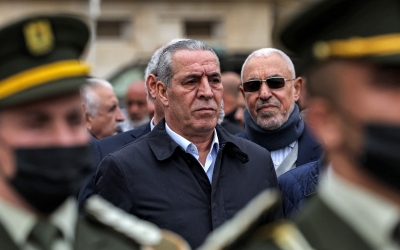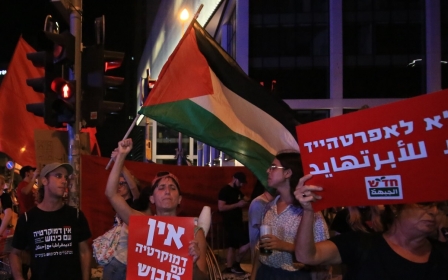Israel authorises three settler outposts in West Bank

The US has condemned Israel’s decision to "legalise" three settler outposts in the occupied West Bank, just a day after a phone call between US Secretary of State Anthony Blinken and Prime Minister Benjamin Netanyahu discussed deepening Israel's integration in the region.
On Wednesday night, the Israeli military officially designated the boundaries of the three remote outposts: Beit Hoglah located between the city of Jericho and the Dead Sea, and Avigail and Asael south of the Hebron Hills. The process turns the outposts into settlements recognised by the state of Israel, not the international community.
The decision, announced earlier this year despite resistance from the US, is a clear signal that the Israeli government is moving ahead with a plan to grant retroactive authorisation to nine Israeli settler outposts deep in the occupied West Bank.
A State Department spokesperson told MEE the US had been “clear and consistent” that expanding settlements “undermines the geographic viability of a two-state solution, exacerbates tensions, and further harms trust between Israelis and Palestinians”.
“We strongly oppose the advancement of settlements and the retroactive legalization of settlements that were previously illegal under Israeli law and urge Israel to refrain from this activity,” the spokesperson added.
New MEE newsletter: Jerusalem Dispatch
Sign up to get the latest insights and analysis on Israel-Palestine, alongside Turkey Unpacked and other MEE newsletters
Israel has occupied the West Bank and East Jerusalem since seizing the land from Jordan in the 1967 war. Under international law, settlements built on occupied land are considered illegal.
The Israeli government, however, differentiates between settlements that are permitted by the defence ministry and outposts, those built without Israeli government permits. In recent years, settlers have expanded the construction of the latter and have pushed for recognition.
Prime Minister Benjamin Netanyahu’s government has approved a record number of outposts in the occupied West Bank. His government includes two pro-settler ministers, who support annexing the occupied West Bank.
Netanyahu handed over settlement planning approval in the occupied West Bank to Israel’s far-right finance minister Bezalel Smotrich, who is himself a settler.
Settlements loom over normalisation
The Israeli move comes at a time when the US is trying to broker an agreement for Saudi Arabia to normalise ties with Israel. A State Department readout of Blinken and Netanyahu’s call on Tuesday said the two discussed “expanding Israel’s regional integration”.
Brett McGurk, the White House's top Middle East advisor, and Barbara Leaf, assistant secretary of state for Near Eastern affairs, travelled to Saudi Arabia this week to discuss normalisation.

In exchange for normalising ties, Riyadh wants security guarantees from the US, help in developing a civilian nuclear programme, and fewer restrictions on US arms sales. But it is also seeking the backing of the leadership of the Palestinian Authority (PA).
The Palestinians are demanding greater control of parts of the occupied West Bank along with other asks, Middle East Eye has reported.
The West Bank is divided into three areas with the PA exerting limited control of areas A and B, while Israel has full control of Area C, which forms 60 percent of the Palestinian territory.
Israel’s ultranationalist government is not expected to accept the demand and the expansion of settlements is widely seen as a roadblock to the negotiations.
In an interview with CNN in July, Biden called Prime Minister Benjamin Netanyahu’s cabinet the "most extremist" he has seen since he started working with Israeli prime ministers and said some members of Netanyahu’s government were part of the problem when it comes to the rising violence against Palestinians in the occupied West Bank.
Ties between the US and Israel have mainly come under strain over Netanyahu’s efforts to overhaul the country’s judicial system, which is unpopular with many lawmakers in the Democratic Party.
The Israeli leader has yet to secure a visit to the White House, although Biden and Netanyahu are expected to meet this fall, with the United Nations General Assembly in New York slated as a potential meeting place.
Middle East Eye delivers independent and unrivalled coverage and analysis of the Middle East, North Africa and beyond. To learn more about republishing this content and the associated fees, please fill out this form. More about MEE can be found here.




